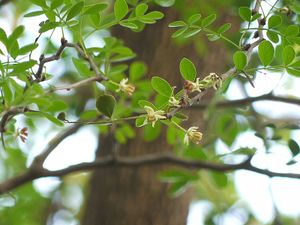Note: This is a project under development. The articles on this wiki are just being initiated and broadly incomplete. You can Help creating new pages.
Difference between revisions of "Limonia acidissima - Kapitha"
m (Jayashree moved page Limonia acidissima to Kapitha) |
|||
| Line 1: | Line 1: | ||
[[File:Limonia acidissima (6941726106).jpg|thumb|right|''Kapitha'', ''Limonia acidissima'']] | [[File:Limonia acidissima (6941726106).jpg|thumb|right|''Kapitha'', ''Limonia acidissima'']] | ||
| + | '''Limonia acidissima''' is the only species within the monotypic genus Limonia. It is native to the Indomalaya ecozone to Bangladesh, India, Pakistan, Sri Lanka, and in Indochinese ecoregion east to Java and the Malesia ecoregion. Common names for the species in English include '''''wood-apple''''' and '''''elephant-apple'''''. It is reputed for its medicinal properties.<ref name="uses"/> | ||
| − | + | == Description == | |
| + | |||
| + | Limonia acidissima is a large tree growing to 9 metres (30 ft) tall, with rough, spiny bark. The leaves are pinnate, with 5-7 leaflets, each leaflet 25–35 mm long and 10–20 mm broad, with a citrus-scent when crushed. The fruit is a berry 5–9 cm diameter, and may be sweet or sour. It has a very hard rind which can be difficult to crack open, and contains sticky brown pulp and small white seeds. The fruit looks similar in appearance to the Bael fruit (Aegle marmelos). | ||
| + | == Uses == | ||
| + | |||
| + | The fruit is used to make a fruit juice with astringent properties and jams. Its leaves also have medicinal properties and are considered auspicious to be offered to Lord Shiva in pujas. A majority of the Hindu temples will have a sacred tree with in its compound and is known as the sthala vriksha. | ||
| + | |||
| + | == References == | ||
| + | |||
| + | <references> | ||
| + | <ref name="uses">[https://www.organicfacts.net/health-benefits/fruit/health-benefits-of-wood-apple-or-bel-fruit.html Health Benefits of Wood Apple or Bel Fruit]</ref> | ||
| + | </references> | ||
| + | |||
| + | == External Links == | ||
| − | + | *[https://en.wikipedia.org/wiki/Limonia_acidissima Limonia acidissima-Wikipedia] | |
[[Category:Herbs]] | [[Category:Herbs]] | ||
Revision as of 16:02, 2 January 2017
Limonia acidissima is the only species within the monotypic genus Limonia. It is native to the Indomalaya ecozone to Bangladesh, India, Pakistan, Sri Lanka, and in Indochinese ecoregion east to Java and the Malesia ecoregion. Common names for the species in English include wood-apple and elephant-apple. It is reputed for its medicinal properties.[1]
Contents
Description
Limonia acidissima is a large tree growing to 9 metres (30 ft) tall, with rough, spiny bark. The leaves are pinnate, with 5-7 leaflets, each leaflet 25–35 mm long and 10–20 mm broad, with a citrus-scent when crushed. The fruit is a berry 5–9 cm diameter, and may be sweet or sour. It has a very hard rind which can be difficult to crack open, and contains sticky brown pulp and small white seeds. The fruit looks similar in appearance to the Bael fruit (Aegle marmelos).
Uses
The fruit is used to make a fruit juice with astringent properties and jams. Its leaves also have medicinal properties and are considered auspicious to be offered to Lord Shiva in pujas. A majority of the Hindu temples will have a sacred tree with in its compound and is known as the sthala vriksha.
